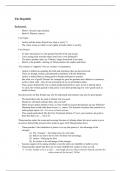The Republic
Background:
- Book I: Socratic type elenchus.
- Book II: Platonic context.
Core Topic:
- Justice and the nature thereof (see what is ‘piety’?)
- The virtue owing to which we act rightly towards others in society.
Core Project:
- To show that justice is to the greatest benefit of the just person.
- Can’t acting justly towards others entail one’s own disbenefit?
- The above problem takes on ‘Platonic’ shape from Book II onwards.
- Book I is the prelude, centring on Thrasymachus, the sophist and rhetor.
‘The tyranny of “appetite” (for sex, money) vs temperance
- Justice is defined as speaking the truth and returning what one has borrowed.
There are though, formal, and substantive problems with this definition.
- Justice is defined then as doing good to friends and harm to enemies.
But what sort of good? Doctors for example do good for patients and cobblers to customers,
as this is their craft – they do not necessarily do so out of kindness alone.
Thus, justice defined this way is about producing benefit as such, its job is already taken.
As such, the wisdom gained is that justice is not about producing first order goods such as
health of shoes.
Socrates points out that friends may also be bad people and enemies may also be good people.
- We should then only do good to friends who are good.
- Should we still harm enemies then, who are bad?
Harm always makes animals worse, so why would be assume that humans are any different?
Harming them would make them worse, i.e., unjust. The function of justice then cannot be to
make people unjust. So, ‘it is never to harm anyone,’
- This sounds particularly like the New Testament dictum of ‘Love your enemies, do good to
them that hate you,’… but is it?
Thrasymachus enters the scene and accusing Socrates of refuting others but never seems to give
an answer himself (the present writer tends to agree with Thrasymachus here)
- Thrasymachus’s first definition of justice is to say that justice is ‘the advantage of the
stronger,’
(1) The ‘stronger’ = the ruling class of a city/state.
(2) Rulers are said to devise laws for their own advantage.
(3) Justice = Obeying the laws
(4) So, justice is the advantage of the stronger.
- Socrates targets (2) by asking whether or not the rulers are infallible or liable to error.
- Thrasymachus admits that they are not only infallible but weaker in error as well.
T: ‘A ruler, insofar as he is a ruler … unerringly decrees what is best for himself, and this his
subject must do [to be just]’ (341a)
, - Socrates uses the example of a doctor, another craft – and poses the question of whether or
not a doctor, doctors for his own advantage or that of his patients?
- Crafts are ‘by nature set over [their subjects] to provide what is to their advantage..’ (a ship’s
captain for example)
- Each craft then is perfect insofar as it serves its subjects – and so no qua professional seeks
his own advantage.
- Socrates: ‘So, then, Thrasymachus, no one in any position of rule, insofar as he is a ruler …
orders what is advantageous to himself, but … to his subjects,’
- Thrasymachus states that the one professional who seeks his own advantage is the shepherd,
that true rulers think of their subjects like sheep. So that the sheep (subject) serves its master
and not vice versa.
- So what people tend to call injustice is in fact justice: ‘that is, helping the stronger to pursue
their own advantage,’. This, Thrasymachus states is ‘freer and more masterly’ than so-called
justice. Especially when it is allowed to profit from/outdo others on a large scale.
Socrate’s counterattack (threefold elenchus) to Thrasymachus’ argument:
(1) Socrates states that Thrasymachus has not distinguished the true shepherd from the money-
maker and that for any craft, wage-earning is in effect an additional craft. He states that true
professionals don’t aim at profit as true rulers do not want to rule.
‘They approach ruling not as something good or something to be enjoyed, but as something
necessary, since it can’t be entrusted to anyone better …’ (347c-d)
Socrates argues that in a good city, citizens would fight in order not to rule, just as they do
now in order to rule. There it would be quite clear that anyone who is really a true ruler
doesn’t by nature seek his own advantage but that of his subjects,’
(2) A [conventionally] just person wants to ‘outdo’ an unjust person, but not a just one.
A [conventionally] unjust person wants to outdo (‘get the most he can from,’) a just person
but also an unjust person.
But in any branch of knowledge, a knowledgeable person does not seek to outdo his peers,
i.e., say something different to them – e.g., doctors.
An unjust person seeks to outdo both those like and those unlike him.
So an unjust person is ignorant. (and hence bad)
(3) Let’s assume (conventional) injustice is more powerful than justice. If members of a group –
even a band of thieves – are unjust to one another, they cannot achieve their common, unjust
purpose.
(Because injustice brings in-fighting, ‘civil war’)
So, within an unjust individual, injustice will also cause dissension and so, injustice is less
powerful than justice, whether in groups or individuals.
After this argument concludes, Socrates says he has not had a fine banquet because they still have not
defined justice.





